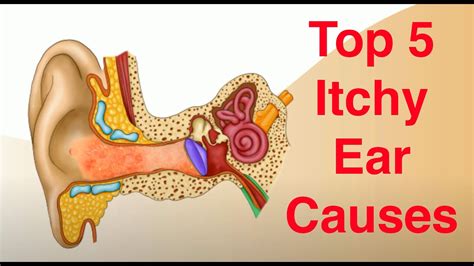Itchy ears are a common problem that can affect people of all ages. While the temporary discomfort usually goes away on its own, persistent itching can be a sign of an underlying medical condition that requires treatment.

Common Causes of Itchy Ears
- Dry skin. The most common cause of itchy ears is dry skin. This can be caused by a number of factors, including cold weather, low humidity, or harsh soaps.
- Eczema. Eczema is an inflammatory skin condition that can cause dry, itchy skin. It can affect any part of the body, including the ears.
- Psoriasis. Psoriasis is another inflammatory skin condition that can cause dry, itchy skin. It often affects the scalp, knees, and elbows, but it can also affect the ears.
- Allergies. Allergies to things like pollen, dust, and pet dander can cause itchy ears. This is because the allergens can cause the ears to swell and become inflamed.
- Earwax. Earwax is a natural substance that helps to protect the ears from infection. However, too much earwax can cause the ears to become blocked and itchy.
- Infection. Bacterial or fungal infections can cause the ears to become itchy. This is because the infection can cause the ears to swell and become inflamed.
Symptoms of Itchy Ears
The most common symptom of itchy ears is, of course, itching. Other symptoms can include:
- Redness
- Swelling
- Pain
- Drainage
- Hearing loss
Treatment for Itchy Ears
The treatment for itchy ears depends on the underlying cause.
- Dry skin. If dry skin is the cause of your itchy ears, you can try using a moisturizer to help soothe the skin. You can also try using a humidifier to add moisture to the air.
- Eczema. Eczema can be treated with a variety of medications, including topical creams and ointments, oral medications, and light therapy.
- Psoriasis. Psoriasis can be treated with a variety of medications, including topical creams and ointments, oral medications, and light therapy.
- Allergies. If allergies are the cause of your itchy ears, you can try to avoid the allergen. You can also try using over-the-counter antihistamines to help relieve symptoms.
- Earwax. If earwax is the cause of your itchy ears, you can try using an over-the-counter earwax removal kit. You can also try irrigating your ears with warm water.
- Infection. If an infection is the cause of your itchy ears, you will need to see a doctor for treatment. Antibiotics or antifungal medications may be prescribed.
Prevention of Itchy Ears
There are a few things you can do to help prevent itchy ears:
- Keep your ears clean. Use a soft cloth to gently clean the outside of your ears every day. Do not insert anything into your ears, as this can damage the eardrum.
- Moisturize your ears. If you have dry skin, apply a moisturizer to your ears every day. You can also try using a humidifier to add moisture to the air.
- Avoid allergens. If you are allergic to something, try to avoid exposure to that allergen.
- Get regular checkups. If you have a history of ear problems, see your doctor for regular checkups. This will help to ensure that any problems are detected and treated early on.
Hot Search Title: Itchy Ears 2025: Everything You Need to Know
FAQs
-
What is the most common cause of itchy ears?
The most common cause of itchy ears is dry skin. -
What are the symptoms of itchy ears?
The most common symptom of itchy ears is itching. Other symptoms can include redness, swelling, pain, drainage, and hearing loss. -
How do I treat itchy ears?
The treatment for itchy ears depends on the underlying cause. If the cause is dry skin, you can try using a moisturizer. If the cause is an infection, you will need to see a doctor for treatment. -
How can I prevent itchy ears?
There are a few things you can do to help prevent itchy ears, including keeping your ears clean, moisturizing your ears, and avoiding allergens. -
When should I see a doctor about itchy ears?
You should see a doctor about itchy ears if the itching is severe, if it does not go away on its own, or if you have other symptoms such as redness, swelling, or pain. -
What are the long-term effects of itchy ears?
If itchy ears are not treated, they can lead to a number of complications, including infection, hearing loss, and scarring.
















